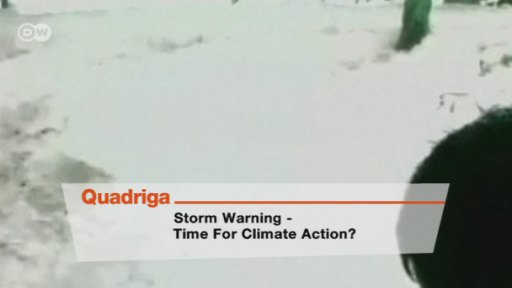Quadriga

This browser does not support the video element.
And if there is, why are we having so much trouble coming to an agreement on how best to protect the environment?
Many believe that rising temperatures pose a real threat to the future of our species, and warn that failing to react now could have disastrous consequences in the near future. That's why the 12,000 delegates from all over the world who have traveled to Warsaw are supposed to work out an effective roadmap for approving a universal climate agreement in 2015 in Paris. The ultimate goal is to reduce carbon dioxide emissions.
Climate researchers say that tropical storms have grown more common in the last three decades, and their models predict extreme weather will become even more frequent in the future. Insurance companies are worried that claims due to damage caused by meteorological events like hurricanes could skyrocket. And many of the nations that will suffer most from flooding and drought are developing countries like the Philippines.
But critics warn that the data is still inconclusive, and believe fast decisions would be little more than a panicked response to the situation. Tropical storms are after all nothing new, they say, and climate change can't be exclusively due to human activity.
Is there a connection between growing affluence and natural disasters? How can governments get past purely national interests and agree on a common global approach to climate protection? Why do we still have so little to show for all the years of negotiations?
Tell us what you think: Storm Warning - Time For Climate Action?
quadriga[at]dw.de
Our guests:
Stefano Casertano he is the correspondent for the italian business newspaper Linkiesta in Berlin. He also taught international politics at Potsdam University, and was a Senior Fellow at the Brandenburg Institute for Society and Security. He served as international affairs advisor for the Italian Ministry of Economic Development and published four books about geopolitics, starting with a History of Cold War in 2009. In 2010, he has been nominated "Italian Young Leader" by the US-Italy council; and "Aspen Young Fellow" by the Aspen Institute.
Michael Bauchmüller an economist by training, Bauchmüller worked at the business desk of the "Süddeutsche Zeitung" from 2001 until the summer of 2005. He then moved to the parliamentary desk. There he focuses on energy issues, environmental concerns as well as transport policy. His book, "The 10 Errors of Globalisation Opponents", which he wrote with a colleague, was published in 2003.
Sabine Fuss studied international economics at the University of Maastricht, where she also completed a PhD on sustainable development in the energy sector. She led a group working on economic risk at the Ecosystems Services and Management Program of the International Institute for Applied Systems Analysis (IIASA), where she was responsible for projects in the area of climate change. Dr. Fuss now leads the working group on Resources and International Trade at the Mercator Research Institute on Global Commons and Climate Change.